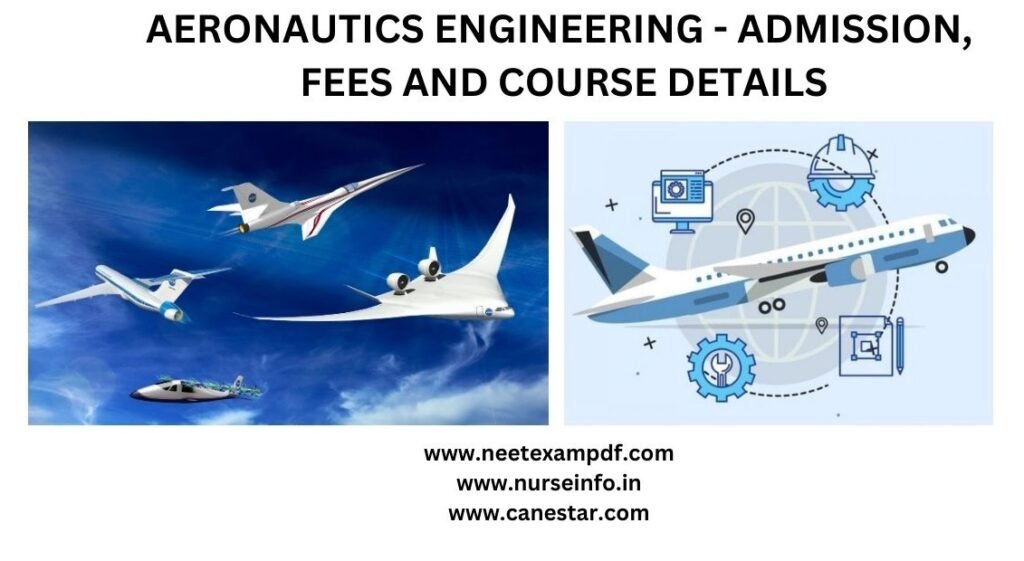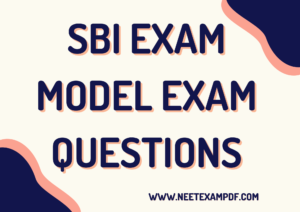AERONAUTICS ENGINEERING – COURSE, ADMISSION, ELIGIBILITY, COURSE CURRICULUM AND FEE STRUCTURE
The admission process, eligibility criteria, and course curriculum may vary for each institute. It is recommended to visit their respective websites for more information.
ADMISSION PROCESS
The admission process for aeronautics courses in India varies depending on the institute and the level of study (undergraduate or postgraduate). Here are some general steps to follow:
For Undergraduate Courses:
- Candidates need to appear for the Joint Entrance Examination (JEE) Main conducted by the National Testing Agency (NTA) for admission to undergraduate courses in IITs, NITs, and other engineering colleges.
- Some private colleges and universities may conduct their own entrance exams for admission to undergraduate courses.
- Candidates need to meet the minimum eligibility criteria set by the institute, which may include academic qualifications and age limit.
- Shortlisted candidates may be called for a counseling session, which may include personal interview and group discussion.
For Postgraduate Courses:
- Candidates need to appear for the Graduate Aptitude Test in Engineering (GATE) conducted by the Indian Institute of Technology (IIT) for admission to postgraduate courses in IITs and other engineering colleges.
- Some private colleges and universities may conduct their own entrance exams for admission to postgraduate courses.
- Candidates need to meet the minimum eligibility criteria set by the institute, which may include academic qualifications and work experience.
- Shortlisted candidates may be called for a counseling session, which may include personal interview and group discussion.
ELIGIBILITY CRITERIA
The eligibility criteria for aeronautics courses in India vary depending on the institute and the level of study (undergraduate or postgraduate). Here are some general eligibility criteria that most institutes follow:
For Undergraduate Courses:
- Candidates must have passed 10+2 examination with Physics, Chemistry, and Mathematics as core subjects.
- Candidates must have scored a minimum of 50% marks in their 10+2 examination (relaxation in marks may be provided to reserved category candidates).
- Candidates must have qualified the Joint Entrance Examination (JEE) Main conducted by the National Testing Agency (NTA) or any other entrance exam conducted by the respective institute.
For Postgraduate Courses:
- Candidates must have completed a Bachelor’s degree in Aerospace/Aeronautical Engineering or related field.
- Candidates must have scored a minimum of 60% marks in their Bachelor’s degree (relaxation in marks may be provided to reserved category candidates).
- Candidates must have qualified the Graduate Aptitude Test in Engineering (GATE) conducted by the Indian Institute of Technology (IIT) or any other entrance exam conducted by the respective institute.
COURSE CURRICULUM
The course curriculum for aeronautics courses in India varies depending on the institute and the level of study (undergraduate or postgraduate). However, here is a general overview of the subjects that are covered in these courses:
For Undergraduate Courses:
- Aerodynamics
- Aircraft structures
- Propulsion systems
- Flight dynamics and control
- Avionics
- Materials science and engineering
- Aircraft design and manufacturing
- Computational fluid dynamics
- Aerospace systems and technology
- Spacecraft technology
- Industrial training and internships
For Postgraduate Courses:
- Advanced aerodynamics
- Aerospace propulsion
- Aircraft design and optimization
- Aerospace materials and manufacturing
- Aircraft instrumentation and control systems
- Computational fluid dynamics
- Aerospace structural analysis and design
- Spacecraft dynamics and control
- Aerospace systems and technology
- Avionics and navigation systems
- Industrial training and internships
FEE STRUCTURE
The fee structure for aeronautics courses in India varies depending on the institute and the level of study (undergraduate or postgraduate). Here is a general overview of the fee structure for these courses:
For Undergraduate Courses:
- Indian Institute of Technology (IIT): The annual tuition fee for undergraduate courses ranges from INR 2-3 lakhs per annum for general category students. However, fee waiver schemes are available for students belonging to reserved categories.
- Private universities: The annual tuition fee for undergraduate courses ranges from INR 1-3 lakhs per annum. However, scholarship schemes are available for meritorious students.
For Postgraduate Courses:
- Indian Institute of Technology (IIT): The annual tuition fee for postgraduate courses ranges from INR 60,000 to 2 lakhs per annum for general category students. However, fee waiver schemes are available for students belonging to reserved categories.
- Private universities: The annual tuition fee for postgraduate courses ranges from INR 1-3 lakhs per annum. However, scholarship schemes are available for meritorious students.
The fee structure may vary for each institute. It is recommended to visit their respective websites for more detailed information on the fee structure and scholarship schemes. Additionally, the cost of living expenses such as accommodation, food, and transportation should also be taken into consideration.

